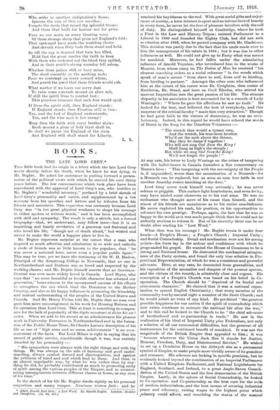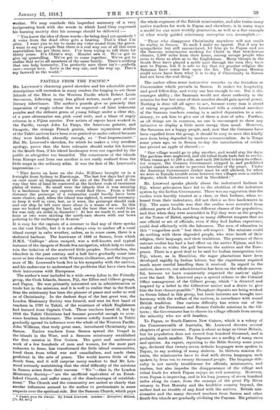BOOKS.
THE LATE LORD GREY.*
THIS little book had its origin in a letter which the late Lord Grey wrote shortly before his death, when he knew he was dying, to Mr. Begbie. He asked for assistance in putting forward a presen- tation of the political views with which he started life over thirty years before. The few conversations which took place have been reproduced with the approval of Lord Grey's son, who testifies to Mr. 13egbie's " wonderful accuracy," prefaced by a brief sketch of Lord Grey's personality and career, and supplemented by a few extracts from his speeches and letters and by tributes from his friends and associates. This expansion was necessary because Lord Grey was " in too great physical weakness to shape his message in either spoken or written words," and it has been accomplished with skill and sympathy. The result is only a sketch, not a formal biography—that, we understand, may follow later—but it is an inspiriting and timely revelation of a generous and fraternal soul who loved his life, "though not of death afraid," but wished and strove to make the world a happier place to live in.
Mr. Begbie expresses surprise at the outset that a man who inspired so much affection and admiration in so wide and catholic a circle of friends was so little known to the populace, that " he was never a national hero, never even a popular public figure." This may be true, yet we have the testimony of Sir W. H. Hadow, Principal of the Armstrong College in Newcastle, that no one in Northumberland and Durham was so loved and respected by the working classes ; and Mr. Begbie himself asserts that no Governor- General was ever more widely loved in Canada. Lord Bryce, who says that " no more beautiful or lovable character has adorned our generation," bears witness to the unsurpassed success of his efforts to strengthen the ties which bind the Dominion to the Mother Country, and also to his happy influence in promoting the friendship and mutual understanding of the peoples of the United States and Canada. And Mr. Henry Vivian told Mr. Begbie that no man ever gave him more encouragement in his work for Housing Reform and Co-operation than Lord Grey. This at least is something to compen- sate for the lack of popularity of the digito monetrari et dicier hie est order. When we add to his record as an administrator his pioneer work in University Extension in Northumberland and in the forma. tion of the Public House Trust, Sir Charles Lucas's description of his life as one of " high aims and no mean achievements " is no over- statement of the facts. But Lord Milner is right in saying that his record of public service, considerable though it was, was entirely dwarfed by his personality :- " His sympathies were always with the right things and with big things. He was always on the side of harmony and good under- standing, always against discord and disintegration, and against the pettiness of mind and soul which lead to them. And thus, in an almost impalpable way, by what he was rather than by any- thing he did, he probably contributed as much to promoting unity of spirit among the various peoples of the Empire, and to counter- acting estrangements between different classes at home, as any man of his time."
In the sketch of his life Mr. Begbie dwells rightly on his personal magnetism and sunny temper. Neminem tristem fecit : and he • Albert, Fourth Earl Grey : a Last Word. By Harold Begbie. London : Hodder and Stoughton. (28. 6d. net.] retained his boyishness to the end. With great social gifts and enjoy- ment of society, a keen interest in sport and an intense love of beauty in every form, he never let the lure of pleasure interfere with the call of duty. He distinguished himself at Cambridge, where he took a First in the Law and History Tripos; entered Parliament as a Liberal in 1880 and founded the Eighty Club, but did not seek re-election after 1886, when he parted company with Mr. Gladstone. This decision was partly due to the fact that his uncle made over to him the management of his estate in 1884 ; but it was due to other influences as well. He could not give up to Party what was meant for mankind. Moreover, he had fallen under the stimulating influence of Arnold Toynbee, who introduced him to the works of Mazzini, from whose essay on The Duties of Man he received " his clearest marching orders as a social reformer " in the words which speak of man's ascent " from slave to serf, from serf to hireling, from hireling to partner." Amongst the other men who influenced him at the outset of his career were Dr. Creighton, then rector of Embleton, Mr. Stead, and later on Cecil Rhodes, who stirred his nascent Imperialism into the great passion of his life. The strange disparity in his associates is best accounted for in a remark of Lady Wantage's " Where he gave his affections he saw no fault." He looked for the best, and believed the best of everybody, and this suspense of the critical faculty " made him very attractive." Though he had great faith in the virtues of democracy, he was no revo- lutionary. Indeed, in this regard he would have echoed the words of Burns in the Song for the Dumfries Volunteers :-
" The wretch that -would a tyrant own,
And the wretch, his true-born brother;
Who'd set the mob above the throne, May they be damn'd together !
Who will not sing God Save the King I Shall hang as high's the steeple ; But while we sing God Save the King We'll not forget the people 1 " At any rate, his letter to Lady Wantage on the crime of tampering with the ballot-boxes in Canada furnishes a fine commentary on Burns's lines : " This tampering with the sovereignty of the People is, if unpunished, worse than the assassination of a Monarch—for a Monarch can be replaced, but as soon as men lose faith in one another Anarchy comes knocking at the door."
Lord Grey never took himself very seriously ; he was never solemn or priggish. This surface light-heartedness, and even levity, may have misled some observers as to his real aims. He was an enthusiast who thought more of his cause than himself, and the wisest of his friends are unanimous as to his entire unselfishness. He never exploited his rank, his position, or his opportunities to advance his own prestige. Perhaps, again, the fact that he was so happy in the world as it was made people think that he could not be ardently anxious to reform it. But of his sincerity there can be no doubt after reading his " Last Word."
What then was his message ? Mr. Begbie treats it under four heads—A People's House ; a People's Church ; Imperial Unity ; and Social Comradeship. Detail and mechanism were not his strong points—his force lay in the ardour and confidence with which he propounded his gospeL He wanted the House of Commons to be a strong and National house. He distrusted the mechanical antagon- isms of the Party system, and found the only true solution in Pro- portional Representation, of which he was a consistent and powerful advocate. Here, at any rate, he descended from generalities, and his exposition of the anomalies and dangers of the present system, and the virtues of the remedy, is admirably clear and cogent. His conception of a People's Church was based on his belief in Co- operation. The Church should be " deprived of its feudal and aristocratic character." He claimed that it was a national organ- ization to spread English Christianity ; that every member of the community was by natural right a member of the State Church; and he would admit no tests of any kind. He predicted " the greatest possible happiness for our nation if the spirit of comradeship which now exists continues to animate the national life after the war," and to this end he looked to the Church to be " the chief advocate of brotherhood and co-partnership in trade." He saw in the realization of his ideal of Imperial Unity plus Federalism, not only a solution of all our economical difficulties, but the greatest of all instruments for the continued benefit of mankind. It was not the magnitude of the British Empire that appealed to him ; it was " because wherever the Union Jack flies it stands for Justice, Honour, Freedom, Duty, and Disinterested Service." He wished to set up a Dominion House on the Aldwych site as a permanent symbol of Empire, to make people more vividly aware of its grandeur and romance. His schemes are lacking in specific precision, but he evidently looked beyond the combination of an Imperial Parliament with a United Kingdom Parliament, and National Legislatures for England, Scotland, and Ireland, to a great Anglo-Saxon Consoli- dation of the United States and the free democracies of the British Empire. Lastly, in the sphere of Social Comradeship, he looked to Co-operation and Co-partnership as the best cure for the evils of modern industrialism, and the best means of securing industrial peace and efficiency, raising wages to the highest point which industry could afford, and ennobling the status of the manual
worker. We may conclude this imperfect summary of a very invigorating book with the words in which Lord Grey expressed his burning anxiety that his message should be delivered :-
" You know the idea of those words—he being dead yet speaketh ? A voice from the dead often gets a hearing. That's what I'm after. I want you to try to make my voice sound from the grave. I want to say to people that there is a real way out of all this mess materialism has got them into. I've been trying to tell them for thirty years. It's Christ's way. Mazzini saw it. We've got to give up quarrelling. We've got to come together. We've got to realize that we're all members of the same family. There's nothing that can help humanity, I'm perfectly sure there isn't—perfectly sure—except love. Love is the way out, and the way up. That's my farewell to the world."



























 Previous page
Previous page